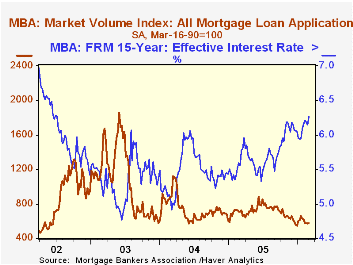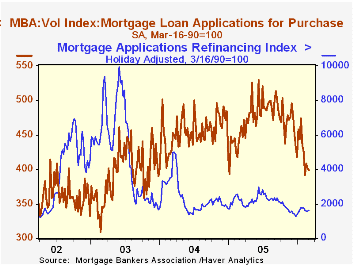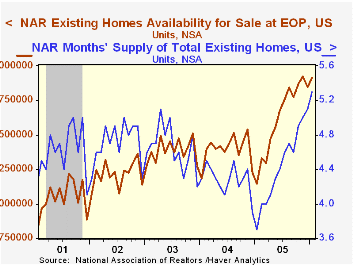 Global| Mar 08 2006
Global| Mar 08 2006Mortgage Applications Ticked Up But Interest Rates Jumped
by:Tom Moeller
|in:Economy in Brief
Summary
During early March the total number of mortgage applications recovered barely half of the prior week's decline. The 0.7% increase followed a 1.2% drop the prior week and left March's opening level 1.8% below the February average which [...]

During early March the total number of mortgage applications recovered barely half of the prior week's decline. The 0.7% increase followed a 1.2% drop the prior week and left March's opening level 1.8% below the February average which fell 6.3% m/m.
The effective interest rate on a conventional 30-year mortgage rose to 6.55%, the sharpest w/w increase since late January. The effective rate on a 15-year mortgage also jumped, by twelve basis points to 6.27% and reached the highest level since mid-2002. Interest rates on 15 and 30 year mortgages are closely correlated (>90%) with the rate on 10 year Treasury securities and during the last ten years there has been a (negative) 82% correlation between purchase applications and the effective rate on a 30-Year mortgage.
Purchase applications fell another 0.4% w/w after a 10.2% during all of February. The early March level is down 1.9% from the February average.
Evidence of housing market weakness was contained in the recent report from the National Association of Realtors that the number of homes for sale rose 2.4% during January. The increase reversed most of a decline during the prior month and left the number of pending home sales up by more than one-third from the year earlier level.
At the current sales level the months' supply of homes on the market rose to 5.3, a record high for total home sales and the supply of single family homes on the market rose to a three year high of 5.2.
During the last ten years there has been a 50% correlation between the y/y change in purchase applications and the change in new plus existing single family home sales.
Applications to refinance rose 2.6% following little change the week earlier and began March 1.2% below the February average which fell 2.0% from January.
The Mortgage Bankers Association surveys between 20 to 35 of the top lenders in the U.S. housing industry to derive its refinance, purchase and market indexes. The weekly survey accounts for more than 40% of all applications processed each week by mortgage lenders. Visit the Mortgage Bankers Association site here.
Postal Savings in Japan and Mortgage Markets in the U.S. from the Federal Reserve Bank of San Francisco is available here.
| MBA Mortgage Applications (3/16/90=100) | 03/03/06 | 02/24/06 | Y/Y | 2005 | 2004 | 2003 |
|---|---|---|---|---|---|---|
| Total Market Index | 575.6 | 571.5 | -18.3% | 708.6 | 735.1 | 1,067.9 |
| Purchase | 399.0 | 400.8 | -11.7% | 470.9 | 454.5 | 395.1 |
| Refinancing | 1,614.4 | 1,573.5 | -25.8% | 2,092.3 | 2,366.8 | 4,981.8 |
Tom Moeller
AuthorMore in Author Profile »Prior to joining Haver Analytics in 2000, Mr. Moeller worked as the Economist at Chancellor Capital Management from 1985 to 1999. There, he developed comprehensive economic forecasts and interpreted economic data for equity and fixed income portfolio managers. Also at Chancellor, Mr. Moeller worked as an equity analyst and was responsible for researching and rating companies in the economically sensitive automobile and housing industries for investment in Chancellor’s equity portfolio. Prior to joining Chancellor, Mr. Moeller was an Economist at Citibank from 1979 to 1984. He also analyzed pricing behavior in the metals industry for the Council on Wage and Price Stability in Washington, D.C. In 1999, Mr. Moeller received the award for most accurate forecast from the Forecasters' Club of New York. From 1990 to 1992 he was President of the New York Association for Business Economists. Mr. Moeller earned an M.B.A. in Finance from Fordham University, where he graduated in 1987. He holds a Bachelor of Arts in Economics from George Washington University.
More Economy in Brief
 Global| Feb 05 2026
Global| Feb 05 2026Charts of the Week: Balanced Policy, Resilient Data and AI Narratives
by:Andrew Cates






